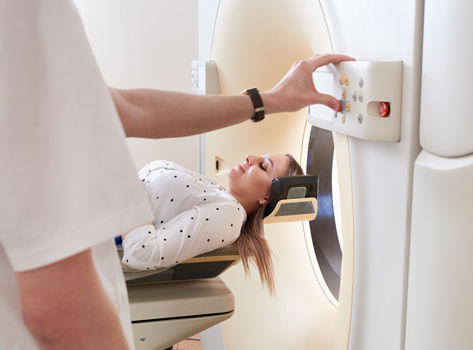
If you’re wondering whether you’re at low, medium, or high risk for heart disease, a relatively new test called a calcium score can provide some insight. It’s a 10-minute imaging scan that shows early-stage plaque buildup in your arteries — all before any symptoms arise.
“One of the major benefits of calcium scoring is that it allows patients and doctors to make informed decisions about treatment. It also helps you and your doctor decide whether cholesterol medication is necessary,” says Henry Altszuler, MD, a cardiologist at Atlantic Health System.
What Is a Calcium Score?
Coronary artery calcium scoring is an imaging test that detects and measures calcium buildup in your coronary arteries. A computed tomography (CT) scan of your heart shows if you have atherosclerosis, which is the narrowing and hardening of the arteries from accumulated plaque.
How Does Calcium Scoring Work?
A CT scanner takes detailed images of your heart and coronary arteries. The images are analyzed, measured and scored for calcified plaque buildup. The best result is a score of zero. A high score, over 400, indicates significant plaque accumulation and a higher risk of heart disease, heart attack and stroke. The test is low-dose, low-risk, low-cost, and takes about 10 minutes.
“Calcium scoring offers valuable insights,” says Dr. Altszuler. “A high score can be the wakeup call that motivates someone to make major lifestyle changes and talk to their doctor about medication and additional testing. A low score can put someone’s mind at ease who has been worrying about their risk. For those who land somewhere in the middle, it helps us know how closely we need to monitor a patient’s condition and may prompt adjustment of their treatment.”
Who Benefits From a Calcium Score?
Dr. Altszuler primarily uses calcium scores to proactively identify people who have silent, early-stage coronary disease. The goal is to prevent them from developing symptoms, heart attack and stroke. He also uses calcium scores to defer statin use in selected patients.
“This test is for asymptomatic intermediate-risk patients and for some low-risk patients who have specific risk-enhancing factors that are not included in the American Heart Association’s risk calculator. High-risk patients may not benefit from the scan since they will likely need more advanced tests and treatment regardless of their score,” says Dr. Altszuler.
For those people with an intermediate-risk level, the test helps cardiologists determine how aggressive they need to be to prevent potential coronary plaque buildup. A calcium score is a useful tool to help reclassify an intermediate-risk patient into a low- or high-risk category.
What Does the Score Mean?
Dr. Altszuler cautions that a calcium score of zero doesn't mean there’s no plaque in your arteries. It just means there is no calcified plaque, while soft plaque may still be present.
“I tell my patients that a calcium score of 0 doesn’t mean there’s no atherosclerosis. It just means that their risk is currently low. I encourage these intermediate-risk people to repeat the scan in three to five years because atherosclerosis is chronic and progressive. We may not have plaque buildup when we’re 40, but it just might develop when we’re 45, 50 or even later in life.”
Be Proactive About Your Health
To stay safe and healthy, it's good to have a primary care provider who knows and understands your health history and wellness goals.